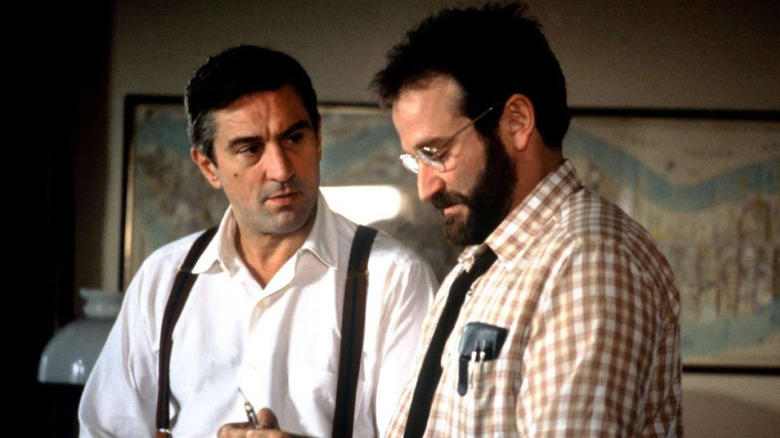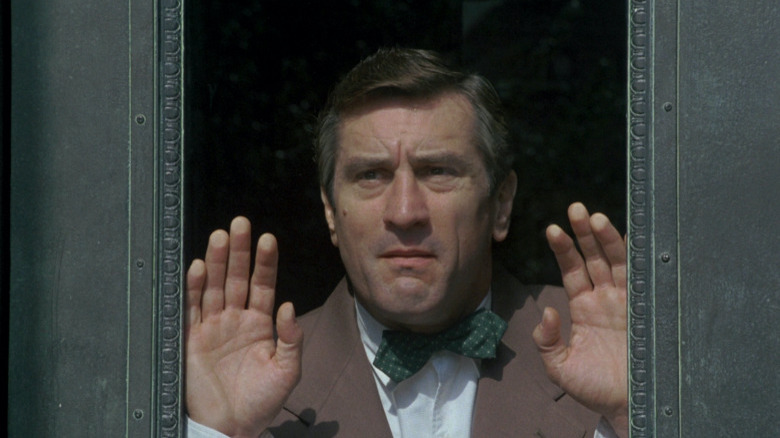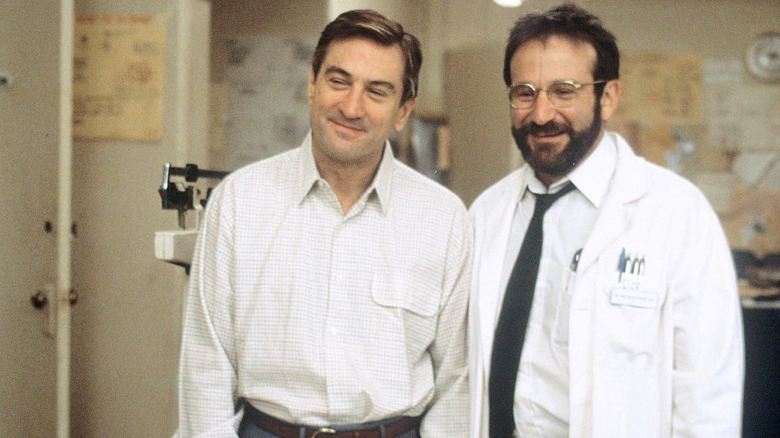Robin Williams Wasn't Sure He Could Make Awakenings Work With Robert De Niro
Thanks to the one-two punch of 1987's "Good Morning, Vietnam" and 1989's "Dead Poets Society," Robin Williams had proven he was not just a skilled character actor but could tackle roles far removed from the bouncing-off-the-walls persona he embodied in his stand-up comedy. Yet, each film came with an asterisk. After all, "Good Morning, Vietnam" was written specifically for Williams, while there were still glimpses of his zestful comedic mannerisms ill-suited to the rest of his performance in "Dead Poets Society."
Enter "Awakenings," the film that served as the next logical step in Williams' evolution as an actor. The movie was loosely based on the 1973 non-fiction book of the same name, in which renowned neurologist Oliver Sacks details how, in the late 1960s, he was able to treat patients who had survived an epidemic of encephalitis lethargica (aka "sleeping sickness") from 1917 to 1928. Williams stars in the film as Sacks' fictitious surrogate Malcolm Sayer, a physician who is able to re-awaken these patients — all of whom have been stuck in a catatonic state for decades by the time the story begins — by giving them L-dopa, a drug previously used to treat Parkinson's disease.
Dr. Sayer is, more or less, everything Williams the animated comic is not. He's introverted, awkward, and more likely to babble on about nerdy scientific details that burst out into an impromptu impersonation. But it wasn't the role itself that made Williams wary of signing on for "Awakenings," having only just gone through a crash-course in restraining his comedic inclinations with "Dead Poets Society" and come out the other side with a Best Actor Oscar nod. It was the prospect of sharing the screen with his co-star, Robert De Niro, that had him worried.
De Niro wanted the glitzier role
De Niro co-stars in "Awakenings" as Leonard Lowe, who's just a young boy when he contracts "sleeping sickness," only to awaken a grown man in the late '60s. Of the two leads, Leonard is a much more showy role than that of Dr. Sayer. He's basically an adult with the naivety and optimism of a child, not unlike Tom Hanks' character in the 1988 dramedy "Big" (minus the magical elements of that film).
Fittingly enough, "Awakenings" was the first movie Penny Marshall called the shots on after directing "Big," drawing from an adapted script by a then lesser-known writer by the name of Steven Zaillian (for context: Marshall's drama came out three years before Zaillian wrote "Schindler's List" and both wrote and directed "Searching for Bobby Fisher"). In Dave Itzkoff's written 2018 biography "Robin," the author quotes Marshall as referring to Leonard as "the glitzy role" in "Awakenings," so it's perhaps no surprise this was also the part that De Niro picked when offered the choice between him or Dr. Sayer.
Having cast Leonard, Marshall turned to Williams for the film's other lead. "He's not thought of as a dramatic actor, but I like to juggle things around. I see things that aren't always apparent," said Marshall. Indeed, by the time "Awakenings" began filming in October 1989, it had only been some four months since "Dead Poets Society" opened in theaters and the rest of the world was starting to cotton onto just what Williams was capable of in a sincere, purely dramatic role.
But Williams still went the distance
Shortly after De Niro boarded "Awakenings," Williams was suddenly stricken with second thoughts. Was he really about to try and go the distance with the star of "The Godfather Part II," "Taxi Driver," and "Raging Bull" in a grounded drama? "He was afraid Bobby was going to blow him off the screen," Marshall put it plainly. "I said, 'I won't let that happen.'"
Both actors would take home their share of critical accolades for the film, with Roger Ebert dubbing De Niro's turn as Leonard "a virtuoso performance" and praising Williams for his own work as Dr. Sayer, calling it "pure and uncluttered, without the ebullient distractions he sometimes adds." But while it was De Niro who would go on to snag a Best Actor Oscar nod (with "Awakenings" also landing a Best Picture nod, as well as a nod for Zaillian's script), it's Williams' turn that left a stronger impression on me after I watched the film.
Maybe it's because I already knew Williams for his lively comedic antics that, when I saw "Awakenings," I was more impressed by the way he was able to stay so uncharacteristically buttoned-down throughout the movie (that and my growing understanding the best acting is often the exact opposite of "the most acting"). If I have a critique of him in the film, it's that Williams seems a little stiff and uncertain at times, like he's visibly struggling not to burst out into his tried-and-true shtick.
Still, it's a fine, understated performance that ranks among Williams' best dramatic work in his career. That he delivered it while also going toe-to-toe with De Niro only makes it that much more noteworthy.


